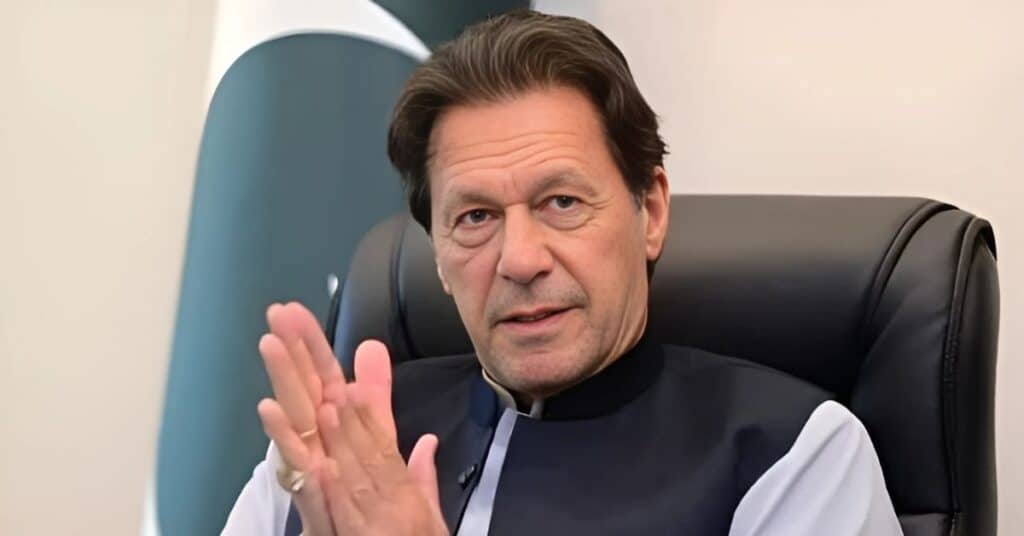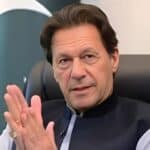Imran Khan rose to international fame as one of cricket’s greatest all-rounders, leading Pakistan to victory in the 1992 Cricket World Cup. Beyond sports, he built a reputation for philanthropy and reform, founding major institutions like the Shaukat
Khanum Memorial Cancer Hospital. His transition from sports icon to politician was marked by the creation of Pakistan Tehreek-e-Insaf, through which he challenged the political establishment. This article explores Imran Khan: The Journey of a Cricket Legend Turned Political Leader, highlighting his rise, premiership, challenges, and lasting impact on Pakistan’s history.
Iman Khan Bio
| Category | Details |
| Full Name | Imran Ahmad Khan Niazi |
| Date of Birth | October 5, 1952 |
| Place of Birth | Lahore, Pakistan |
| Education | Aitchison College, Royal Grammar School Worcester, Oxford University (PPE) |
| Cricket Career | Pakistani all-rounder, Captain of 1992 Cricket World Cup-winning team |
| Major Awards | Wisden Cricketer of the Year, ICC Hall of Fame |
| Philanthropy | Founder of Shaukat Khanum Memorial Cancer Hospital, Namal Institute |
| Political Party | Pakistan Tehreek-e-Insaf (PTI) |
| Political Position | Prime Minister of Pakistan (2018–2022) |
| Key Challenges | Economic crisis, COVID-19 pandemic, military influence, political opposition |
| Removal from Office | Removed by no-confidence vote in 2022 |
| Legal Issues | Faced multiple corruption and terrorism-related charges post-premiership |
| Legacy | Cricket legend, philanthropist, reformist politician |
What was Imran Khan’s career before entering politics?

Imran Ahmad Khan Niazi, born on October 5, 1952 in Lahore, Pakistan, rose to fame as one of the greatest cricket players in the world before becoming a politician. Coming from a respected Pashtun family, he studied at Aitchison College and the Royal Grammar School Worcester in England before earning a degree in PPE from Oxford University. As an all‑rounder, he earned recognition for his incredible skill as both a bowler and batsman, becoming Wisden Cricketer of the Year and later being inducted into the ICC Hall of Fame. His leadership as the captain of the 1992 Cricket World Cup team made him a national hero, as Pakistan won the tournament for the first time under his guidance.
After his retirement, Imran shifted his focus to philanthropy, using his fame to build the Shaukat Khanum Memorial Cancer Hospital and Namal Institute. These projects reflected his passion for serving Pakistan and improving health and education. His cricketing success, combined with his charitable work, built his image as an anti-establishment figure who could challenge the traditional political elite. By the mid‑1990s, many Pakistanis saw him not just as a sports icon but also as someone capable of leading the country through reform and integrity.
When did Imran Khan become Pakistan’s prime minister?
Imran Khan founded the Pakistan Tehreek‑e‑Insaf (PTI) in 1996, aiming to create a new political culture that rejected corruption and promoted justice. His party struggled for years to gain traction, but persistent efforts, rallies, and grassroots movements eventually brought PTI into the spotlight. By 2018, Imran had become the voice of change, often clashing with the political establishment and calling for accountability from ruling families. His charismatic speeches, focus on overseas Pakistanis, and promises of reform captured the imagination of millions.
In 2018, after years of building momentum, he was elected as the Prime Minister of Pakistan. His victory was celebrated across the country and beyond, with global media recognizing his transformation from a cricket legend to a national leader. He presented his vision of a “Naya Pakistan” that aimed to reduce poverty, improve healthcare, and stabilize the economy. However, his election also marked the start of complex relationships with the military, opposition parties, and international powers such as the United States.
What challenges did Imran Khan face during his premiership?
Leading Pakistan from 2018–2022, Imran Khan faced a turbulent period marked by economic and political challenges. His government had to deal with a severe economic crisis, high inflation, and a growing balance‑of‑payments problem. The COVID‑19 pandemic further weakened the economy, forcing his administration to implement tough policies to manage health and financial stability. While some praised his social welfare programs, others criticized his inability to deliver rapid economic growth.
Tensions with opposition parties grew as they accused his government of electoral manipulation and mishandling of governance. Accusations of corruption charges, conspiracy, and excessive military influence began surfacing, creating political unrest. Despite his efforts to launch housing schemes and welfare initiatives, political agitation, protests, and calls for negotiations became common, reflecting the volatile climate during his tenure.
Why was Imran Khan removed from office in 2022?

In April 2022, Imran Khan was removed through a no-confidence vote in the National Assembly, ending his tenure as Prime Minister. Opposition parties formed alliances and claimed that his government had failed to handle the economy and foreign policy effectively. The event sparked widespread protests and pro-Khan demonstrations in Islamabad and Rawalpindi, with many supporters viewing his removal as unjust and orchestrated by powerful forces within the establishment.
Imran alleged that there was a foreign conspiracy against him, which became a rallying cry for PTI supporters. Analysts like Fahd Husain and Aasiya Riaz often highlighted how the political crisis exposed deep rifts between the government and military leadership, including figures like Army Chief Syed Asim Munir. His removal plunged Pakistan into a political deadlock, with rising chaos and pressure tactics from both sides.
What legal troubles did Imran Khan face after his removal from office?
Following his ouster, Imran Khan faced numerous legal cases, including the high-profile Al-Qadir Trust case. Courts charged him with corruption, and at times, he was sentenced to multiple years in jail, with reports suggesting a 14 years sentence in certain cases. His arrest in May 2023 triggered massive protests, particularly on May 9 2023, leading to clashes with security forces in cities like Peshawar. The government responded with a harsh crackdown, detaining thousands of political prisoners and PTI members.
By Spring 2025, his legal troubles continued to dominate headlines, with discussions about bail, civil disobedience, and the release movement gaining momentum. Global media coverage highlighted how overseas Pakistanis rallied support for Imran, while critics debated whether his political strategy was deepening the crisis or steering the country toward much-needed reforms.
News
Recent news on Imran Khan revolves around ongoing court hearings, PTI’s efforts to negotiate with the current government, and the wave of protests demanding his release. Reports often mention incidents like the November 26 demonstrations and increasing unrest due to electoral fraud allegations. Political commentators, including Gohar Ali Khan, have discussed how reconciliation remains difficult due to the mistrust between PTI, the government, and the military.
International outlets like Al Jazeera and BBC continue to track every development, from media coverage of PTI rallies to how remittances from overseas Pakistanis are helping sustain grassroots movements. The charter of demand issued by PTI leaders remains a focal point, calling for free elections, accountability, and fair treatment of detainees and political activists.
Early life and cricket career
Imran’s early years shaped his strong personality and leadership skills. Growing up in Lahore, he displayed discipline and determination, qualities that later made him a successful cricketer. His time at Oxford University exposed him to international culture and ideas, while his return to Pakistan saw him dominate the cricket field. As a skilled all‑rounder, he led his team with passion and strategic thinking.
The highlight of his sports career was undoubtedly the 1992 Cricket World Cup, where he guided Pakistan to its historic win. His captaincy style, calm under pressure, and ability to unite a diverse team earned him immense respect. After retiring, he continued to receive awards and recognition, not just for his cricket but also for his charitable ventures, cementing his reputation as a national hero.
Entry into politics
When Imran founded PTI in 1996, many doubted his political potential. The early years were tough, with little success in elections and accusations that he lacked experience. However, his anti-establishment stance and demand for justice gradually gained public attention. His campaigns against corruption and electoral fraud began resonating with young voters and middle-class Pakistanis who wanted change.
Over time, PTI evolved from a minor party into a powerful political force. Imran’s direct communication style, use of media coverage, and relentless rallies built momentum that ultimately led to major electoral breakthroughs.
Political ascent
Imran’s political rise accelerated after 2013, when PTI emerged as a major contender against traditional parties. His calls for reform, his nationalist appeal, and criticism of the establishment positioned him as a credible leader. By focusing on overseas Pakistanis and promising to recover looted wealth, he connected with the masses.
His victory in 2018 marked the peak of his political ascent, as PTI formed the federal government. This period showed his ability to balance populist rhetoric with governance, though the road ahead was filled with challenges.
Premiership
During his premiership, Imran launched social welfare programs like Ehsaas and low-cost housing schemes. He also aimed to improve healthcare and education, focusing on building a welfare state. Internationally, he tried to maintain strong ties with the USA, China, and neighboring countries, while emphasizing Pakistan’s sovereignty.
However, economic difficulties and growing chaos at home tested his leadership. While his supporters admired his honesty, critics argued that his government lacked experienced policymakers to deliver on promises. His tenure highlighted the delicate balance between civilian governments and the military influence in Pakistan’s politics.
Removal from office, subsequent political activity, and imprisonment
After being removed in 2022, Imran Khan did not step back from politics. He organized large rallies, calling for early elections and fair governance. His speeches inspired many, turning his removal into a movement rather than a setback. Yet, the government’s crackdown, arrests of PTI leaders, and restrictions on media coverage made it difficult for him to campaign freely.
Despite imprisonment and multiple legal cases, his popularity among supporters remained strong. His civil disobedience campaigns and demand for political freedom continue to shape the national debate. His story reflects both the power and struggles of a leader navigating Pakistan’s complex political landscape.
Britannica Chatbot
Reliable sources like Britannica remain essential for understanding Imran Khan’s legacy. Platforms summarizing his cricket, philanthropy, and political career help readers discover verified details without misinformation. Such resources, combined with global news outlets, ensure an accurate picture of his journey from sports champion to statesman.
Cricket:
Cricket defined Imran’s identity long before politics. Known for his fiery spirit and sharp strategy, he was more than just a player—he was a visionary captain. His performance in the 1992 Cricket World Cup turned him into a symbol of resilience and success.
Even today, cricket fans compare his achievements with global legends, highlighting his role in shaping Pakistan’s cricketing culture. His sportsmanship and leadership continue to inspire young athletes aiming to follow his path of determination and excellence.
Conclusion
Imran Khan’s journey from cricket stardom to the highest political office in Pakistan reflects resilience, vision, and determination. His iconic 1992 Cricket World Cup victory made him a national hero, while his work with PTI showcased
his fight against corruption and injustice. Despite challenges like removal from office, legal troubles, and political deadlock, his influence remains strong. Imran Khan continues to inspire millions with his unwavering leadership, philanthropy, and legacy as both a cricket legend and transformative political leader.

Bio Writings, founded by Oscar Wyatt, is a blog dedicated to helping readers craft compelling, personalized biographies. Whether you need a professional bio, personal story, or creative writing tips, Oscar’s engaging content helps you showcase your unique journey with style and clarity.







